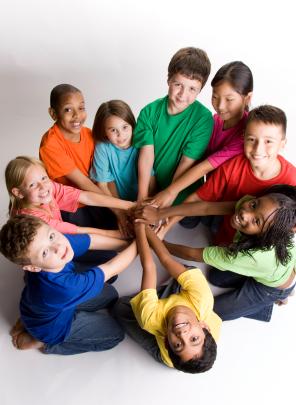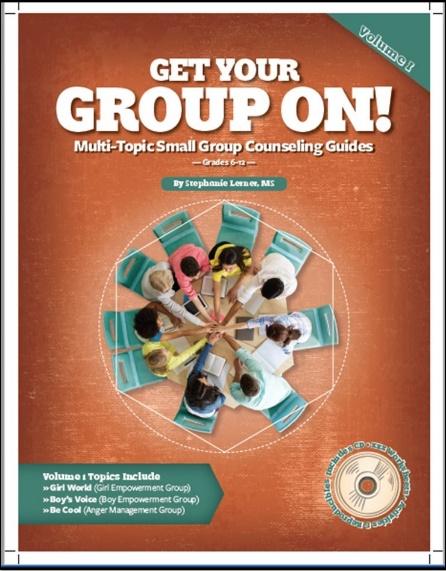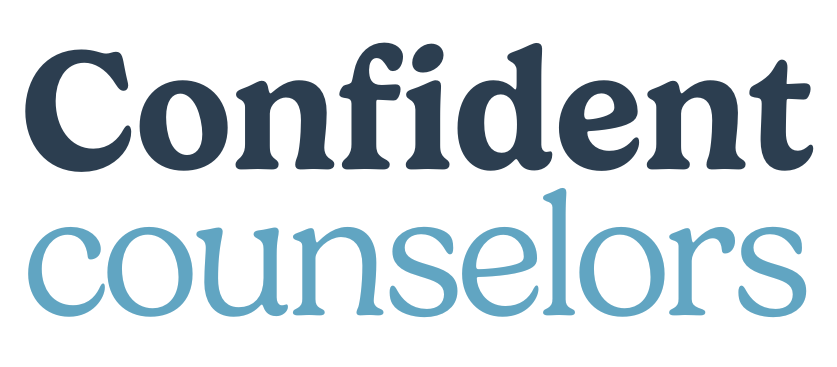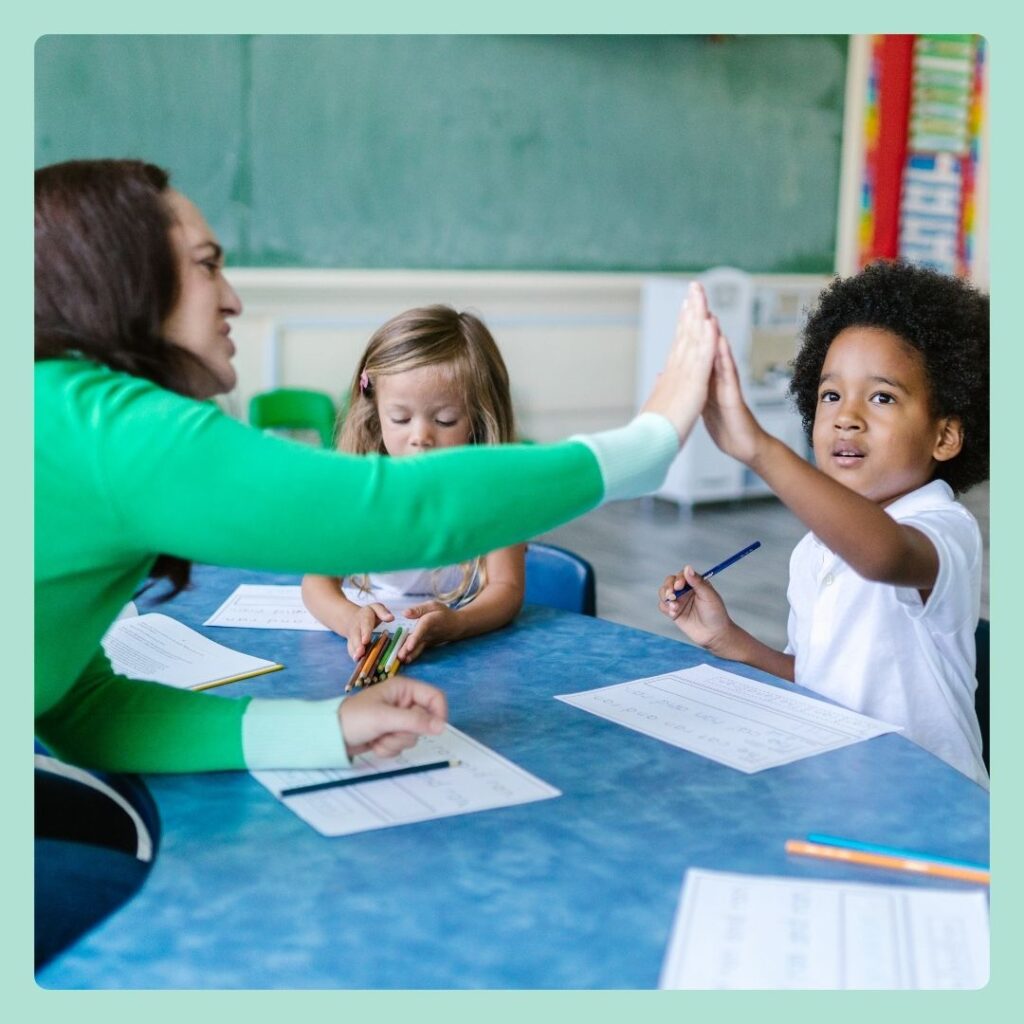One of my professional goals for this year is to keep refining my school counseling support groups. To do this, I’ve been compiling the latest and greatest best practice psychoeducational group counseling tips and techniques. Now, I’d like to share this essential group counseling information with you!

So, let’s start off with a definition- what exactly is a school counseling support group? A student support group is a planned, repeated gathering of 5-10 students who work to learn, apply, or master a skill. However, for the purpose of this post, a school counseling support group is psychoeducational in nature and is led by a mental health professional who helps members gain information and develop skills for challenging situations through education-based techniques.
Why Run a Psychoeducational Group?
Group work is crucial to student success in every school counseling program. In a best practice counseling program, all students receive what is known as Tier 1 Instruction through guidance lessons focused on knowledge and skills from on a set school counseling curriculum. After these guidance lessons are presented to the entire student body, it is reasonable that all students will not master the lesson topics. These are the students who need further instruction through a Tier 2 psychoeducational group.
Generally, when the intensity (fewer students in the learning environment) and frequency (being re-taught the information a second time) are increased, the students who didn’t master the Tier 1 knowledge will be able to master it at Tier 2. Students who do not master the information at Tier 2 can learn it again at Tier 3- but that is a topic for another post.
Another reason that group work is important is that some students have life experiences for which they need specific support. For example, if you have a group of students who are all struggling from recent family changes, such as a divorce, these students may greatly benefit from a psychoeducational group that gives information on how to handle the stress that divorce can create.
Psychoeducational Group Planning
At my school, we start the second semester group planning process in January as soon as we return from Winter Break. This allows us to actually start running the group sessions by the end of January. The planning process to get groups up and running is a bit lengthy because there is just so much to do!
Check out my Group Prep Checklist to keep track of all the tasks.
The first thing I do is interview and orient the prospective group members. We pull these prospective members from a campus-wide needs assessment and discuss three main points with them in individual interviews: we explain the purpose and content of the group, we gage their interest in being a group member, and we give them a group permission form, if they are interested.
The first ones to return a signed permission form are the ones that go into the group. Our counseling office ALWAYS has a waiting list for groups as poverty and family trauma really impact our kids.
Facilitating Your Psychoeducational Group
I have a complete guide to group counseling sessions that provides guidance and activities for all aspects of running a psychoeducational group. Here some of my top recommendations for running each session:
Start each session with a warmup puzzle or relaxation technique related to the session theme. My favorite is the Mindful Minute, where everyone puts their head down and focuses on their breathing for one minute until I sound the chimes to end the exercise. My group members really grow to love this calming start to each session!
Review the group rules together at the start of every session and gently correct any group member not following a rule.
Give a pre/posttest during the first and last session of the group to collect data about knowledge gained.
Teach members how to create a self-chosen SMART goal. Give them time every session to review their goal and share with the group a success, no matter how small.
Provide structured, positive group activities with a bit of fun and a lot of movement thrown in. Teach a 5-10 minute mini-lesson on the session topic.
To link group work directly with success in school, give members a report of their current grades. Encourage them to create their SMART goal to improve their grades. Then review grades and their SMART goal in every session.
If time, play a game such as Coping Skills Bingo or Cool It! to wrap things up in a fun way and keep the overall mood of the group very positive.
Generally, it is best to run psychoeducational groups weekly for 6-8 sessions.
Psychoeducational Group Topics
On my school campus, we will be running between 10-15 school counseling support groups this semester. Here are a few of the groups you can run and how to run them.
Group curriculum guides for the groups below are included in my books, Get Your Group On, Volumes One and Two.

Be Cool – This group uses role play and learning strategies to help students understand and manage their anger. We share info on the damaging health effects of recurring anger and on how to manage anger by changing thoughts and perspectives.
From Grief to Relief – This is my newest group where members support each other through the grief process. Session topics such as choosing their support network, identifying characteristics of the grief process, closure through artistic expression, and envisioning a hopeful future are taught with gentle, soothing activities.

Girl World – This group meets weekly to discuss issues that girls commonly struggle with such as friendships, rumors/gossip, dating and body image. We use group strategies such as role plays, read alouds (one of my favorites is Letters to a Bullied Girl ), art projects, and games.
Additional Psychoeducational Group Resources
Finally, I’d like to share some of my favorite resources that I use in group counseling.
ASCA’S “The School Counselor and Group Counseling”– This is the official position statement on group counseling in schools from the American School Counseling Association; it includes a dynamite resources list!
Healthy Coping Skills– This session activity on healthy coping skills is a MUST for any counseling group.
Watch Wellcast– This Youtube site provides amazing videos on a variety of mental health and school success topics; my students love when I show one in group.
Kidshealth– Superb social, emotional, academic, and behavioral resources for students, I utilize a lot of the Kidshealth resources in my group session information sharing.
Infoaboutkids.org– This site provides cutting-edge science-based info to promote healthy child and family development.
Common Sense Media– This is my go-to site to find video clips highlighting whatever topic we are working on in our session.
And on that note, I’ll leave you with one of the best group counseling comics of all time! I’d love to hear your group counseling experiences, so please leave a comment below.

Happy Counseling!
Other Confident Counselors Posts on Group Counseling
Organize and Run Successful Groups






